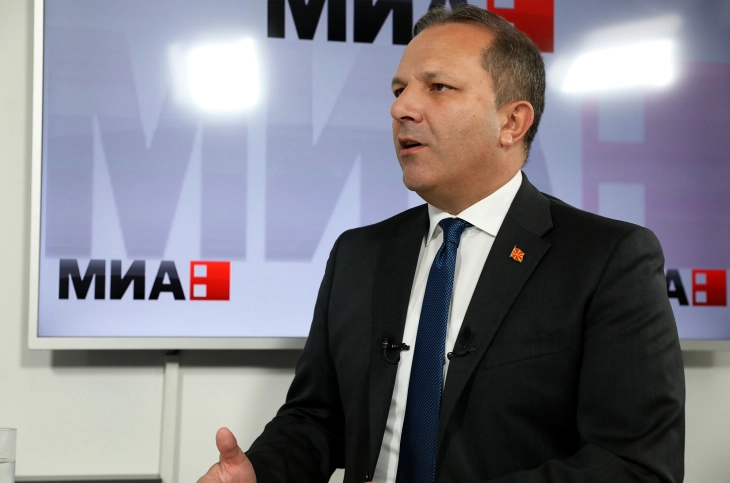Impunity creates new crimes, statutes of limitations in criminal cases negatively affect legal security of citizens, Spasovski tells MIA
- Impunity creates new crimes, and statutes of limitations in criminal cases negatively affect the legal security of citizens, Minister of Internal Affairs Oliver Spasovski said in an interview with MIA, commenting on the part of the provisions of the new criminal code that enabled the statute of limitations of the cases of the former Special Public Prosecutor’s Office (SPO), including the illegal wiretapping cases.

Skopje, 28 October 2023 (MIA) - Impunity creates new crimes, and statutes of limitations in criminal cases negatively affect the legal security of citizens, Minister of Internal Affairs Oliver Spasovski said in an interview with MIA, commenting on the part of the provisions of the new criminal code that enabled the statute of limitations of the cases of the former Special Public Prosecutor’s Office (SPO), including the illegal wiretapping cases.
“Everything that contributes to the statute of limitations of criminal cases, first of all negatively affects the legal security of the citizens, and secondly it has a negative effect, which revolts me as well in relation to not being held accountable for something that was done, which was a serious problem in Macedonian society,” said Spasovski, who was part of the Colorful Revolution that fought against the abolition of people who wiretapped.
As a participant in the April 27 events in the Parliament, he pointed out both as a member of parliament and now, that impunity creates new crimes.
“I will support that with facts. Unfortunately, I am a participant, I can say, in all those unpleasant events. You remember first the on December 24, 2012, when the MPs and journalists were kicked out of the Parliament. And they were not thrown out by someone else, but by members of the Ministry of Internal Affairs who came under order. However, no procedure was opened for that, as it happened, I even additionally, I saw all the documents that those people who came to expel the MPs and journalists were rewarded after that by the leadership of the Ministry of Internal Affairs,” Spasovski said.
_LJgUpaNW0/placeholder.webp?use_watermark=1)
He noted that it is important that impunity and not the opening of the proceedings led to events on April 27 in which, as he said, a group was organized, not to attack democracy, but to overthrow the constitutional order and through that organization some of the MPs, journalists and all those who were inside the Parliament’s building to be killed.
“Therefore a procedure was opened for this, court proceedings were conducted, etc. We have people here serving prison terms. However, we are also talking about other situations of crime, not only this one. Everything that contributes to the statute of limitations of criminal cases, first negatively affects the legal security of the citizens, and secondly it has a negative effect, which revolts me as well in relation to not being held accountable for something that was done, which was a serious problem in Macedonian society,” he underlined.
Regarding the law amendments in terms of efficiency of the procedure and increased possibility of confiscation, the minister said that it is one thing, but it is another thing that those cases were allowed to expire. He said that he does not see the reason of which this was done and that he expects that in the preparation of the new criminal code, on which the experts are already working, will be in full compliance with the EU directives and will justify the expectations of the citizens.
The Operational Technical Agency Skopje (OTA), which was established precisely because of mass wiretapping and is one of the key institutions in the security and crime-fighting chain, has not had a director for more than a month. In an interview with MIA, Minister Spasovski stated that there is information that the public announcement for the director of OTA has been completed and that there are candidates who have submitted documents and that the parliamentary committees will analyse who fulfils the conditions and who does not.
According to the law, the director of OTA, an institution that is supposed to prevent illegal wiretapping, is elected by a two-thirds majority in the Parliament. According to Spasovski, anyone who has any interest in not electing a director of this institution is mistaken.
_IdWMM7Bpa/placeholder.webp?use_watermark=1)
“Because that institution, the Operational Technical Agency, was created to prevent any abuse of the surveillance of electronic communications, learned from what happened in the past. And precisely because of that independent role that has been given to this institution, it is foreseen in the law to elect a director with a two-thirds majority in the Parliament, serving one term. No one can be elected more than twice,” Spasovski said.
He expressed his expectations that through a debate, opened at the political level, a solution will be reached very soon and a director of OTA will be appointed.







